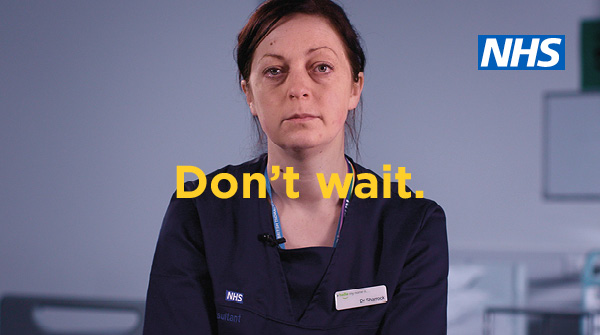“Dont wait to quit” plea to over 50s

A NORTH East doctor appearing in a major quit smoking campaign has appealed to over 50s not to wait to quit smoking after new figures highlight age differences in quitting.
Dr Ruth Sharrock reacted to new figures which show smokers under 30 are more than twice as likely to have stopped smoking because of COVID-19 than those over 50, new research published today shows.
This bucks usual trends which see smokers of all ages quit at similar rates and is despite older smokers being more likely to have health conditions which place them at risk from COVID-19, such as COPD and diabetes.
Analysis undertaken by Action on Smoking and Health (ASH) and University College London (UCL) of 1370 smokers and recent ex-smokers surveyed as part of the YouGov COVID-19 Tracker, found that 5% said they had quit smoking in response to COVID-19.
However, among smokers under 30, 7% said they had quit because of COVID-19 (a further 10% said they’d quit for other reasons since the COVID-19 pandemic) while only 3% of smokers over 50 had quit due to COVID-19 (a further 5% said they had quit for other reasons).
Dr Ruth Sharrock is currently the face of the Don’t Wait campaign from Fresh – a reminder of the many reasons to quit smoking – lung damage, weakened immune systems, cancer, heart attack, diabetes and stroke – which means if people do get the coronavirus, symptoms could be more severe. The campaign – across the North East and North Cumbria – is being launched by Fresh with the North East and North Cumbria NHS Integrated Care System Prevention Board.
Respiratory consultant Dr Ruth Sharrock, from Gateshead Health NHS Foundation Trust and a member of Gateshead Smokefree Alliance, said: “I am hugely impressed by the numbers showing that young people are making serious quit attempts on the back of Covid-19, they will be extending their life expectancy by years and improving the health of themselves and those around them, so I urge them all to stick at it. However, I would also really like to urge those older smokers to seriously consider getting help for a quit attempt, they too will see health benefits, including in those conditions can make people more vulnerable to Covid-19 or make them likely to need hospital care in amongst this situation.
“It is obviously excellent news to see younger people are quitting because the sooner you quit the better. However, it is more urgent for people in their 40s, 50s and 60s to quit smoking to avoid one of the many smoking related diseases.
“I think one issue is that some older smokers assume the damage has been done and it is too late for them. However – it is never too late to see the benefits that come from quitting smoking. I see some incredible success stories from patients who have been able to stop, despite considerable health issues already – they get a new lease of life and all wish they had done it sooner. You should never give up on yourself – my advice is to give it another go and try until you succeed.”
Ailsa Rutter OBE, Director of Fresh, said: “There has possibly never been a more important time to quit smoking than right now. The coronavirus pandemic is focusing everyone’s minds on staying healthy and for people who smoke, quitting is an incredibly important step.
“We know that some people think it is too late to see any benefits from quitting smoking, but the fact is that there are health benefits to be gained from quitting at any age.
“We are delighted to see such support from our NHS and from Directors of Public Health to raise this important message and to encourage more smokers to quit.”
Deborah Arnott chief executive of Action on Smoking and Health (ASH), said: “Education campaigns play a key role in reducing smoking prevalence because they are a highly cost-effective way to motivate smokers to quit and discourage children from becoming addicted in the first place. ASH is delighted to be working closely with both Fresh and the Greater Manchester Making Smoking History programme on the national Quit For Covid campaign too.”
In April figures were published from UK arm of YouGov’s international Covid Tracker suggesting that at least 300,000 people have quit smoking successfully, a further 550,000 have tried to quit and 2.4 million have cut down on the amount of cigarettes they smoke due to growing concerns around coronavirus (COVID-19) and the increased risk smokers may face.
There are a number of reasons why under 30s might have been more likely to change their smoking habits since lockdown:
1. Social lives have been completely disrupted. Young people’s smoking behaviour is more likely to be tied to social settings than older people’s. With the loss of pubs, bars, parties and other social gatherings many young smokers may have had fewer opportunities to smoke and been more inclined to quit.
2. Young people have lost their jobs. Young people are more likely to work in industries that have suffered heavily as a result of lockdown, such as hospitality. Reduced incomes may be a big motivator for some to quit, given that young smokers are more price sensitive than older smokers.
3. Moving back to the family home. There have been reports of more young people moving home as a result of the pandemic and lockdown. This change of circumstances may be driving a change in behaviour for many.
Terry

A COVID-19 scare left 68-year-old Terry Craggs from Walker in Newcastle concerned for his health. After spending a week in hospital on oxygen, he was determined not to go back to smoking and so asked his GP for help.
“I went into hospital with breathing difficulties in March. I had to stay in for a week and they had me on oxygen the whole time. Thankfully, the test for COVID-19 came back negative and I could go home once my breathing improved.
“Although I could smoke when I came out, I knew that I wanted to stop for good. But, with 40 years smoking, I was worried that I might go back to it and wanted help to stay stopped.
“My doctor prescribed patches and a stop smoking inhalator that looked like a tab. I couldn’t use that in the end because of a separate infection but I did use the patches.
“I am on 7mg patches now, the small ones. I am half-way through and once I am done with this pack then I will be finished. I had my oxygen checked recently and they were high which is good. I am hoping that there will be no lasting damage.”
Chris

Gosforth grandfather Chris Easton, 57, decided enough was enough, successfully quitting his 60-a-day smoking addiction during COVID-19, with the help of his GP.
“After a lifetime of smoking I was sick of spending almost £10 a packet on cigarettes. With me smoking 60 cigarettes a day it was costing me a small fortune.
“I started when I was 14, so that is over four decades I had been doing it. At the time, everybody else was smoking and I thought it was the right thing to do, but I know better now.
“It was the cost that was the final straw. COVID-19 also played a big part in contributing to my decision. I lost my wife three years ago to COPD, so I have seen what smoking can do and the devastation it can leave behind. My daughter has been desperate for me to quit since she lost her mam and I wanted to do it for her and my grandkids too.”
Once 31-year-old dad of one and children’s residential support worker Philip from West Denton Park, made up his mind to quit smoking – there was no stopping him.
Philip said: “It has been one of the things that I have been trying to do for some time, but this is the one time I have been able to see it through.
“Because of the lockdown I was spending more money on cigarettes. I work in a children’s home and have worked all the way through. It is good in that I have managed to not be furloughed – but I found I would generally smoke more at work, during my breaks to ‘take five’ as a stress relief. Since I have quit, I don’t get as stressed as I used to.”
